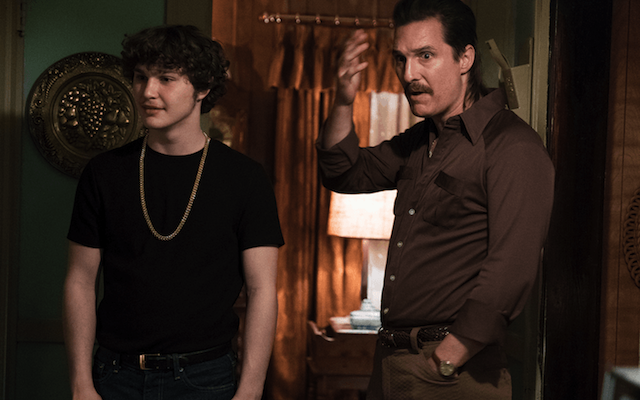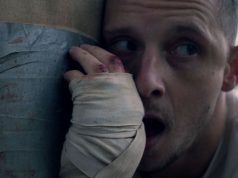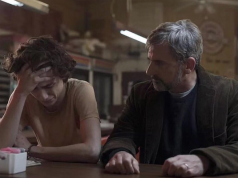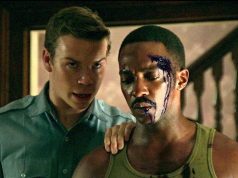
It’s unlikely (I hope) that the Wershe family of Detroit will remind you of your own clan. As portrayed in “White Boy Rick,” a compelling if familiar fact-based drama set in 1984-88, the Wershes are low-class ignoramuses, the type of family where the dad (Matthew McConaughey) and his junkie teenage daughter (Bel Powley) can be having a loud, profane argument in the middle of the street and be joined by Grandpa (Bruce Dern), who pulls up and joins the screaming before he even knows what the topic is.
But as Roger Ebert used to say, movies are an empathy machine, a chance to see the world from someone else’s point of view. There’s plenty of judgment to be passed on the Wershes, and director Yann Demange (following his impressive debut in “’71” ) doesn’t sugarcoat their illegal activity or other questionable choices. But more than anything, “White Boy Rick” is the story of a desperately poor family striving to stay together despite the circumstances. They’re rough, uneducated characters — but they sure love each other.
The dad, Rick Sr., is a licensed gun dealer who operates mostly outside the law, selling weapons and silencers to drug dealers. Mom split years ago; the family has no money and lives in the bad part of town, but Rick has the eternal optimism of a born hustler. Things are always about to turn around for them. He has dreams of opening a chain of video stores. Why not leave this depressed city and start over somewhere else? “The lion don’t leave the Serengeti!” Rick says cheerily.
In the meantime, Rick’s 14-year-old son, Ricky (Richie Merritt), assists him in the gun trade. Confident despite being in the awkward, fuzzy-lipped stage of adolescence, Ricky knows his firearms and has no problem walking boldly into the den of a neighborhood drug gang to make a sale on his dad’s behalf. He comes away not only having closed the deal but having befriended the gang, which includes some kids his age. Amused by his non-blackness, they call him “White Boy Rick.”
Ricky’s knowledge of this drug operation, led by a guy named Johnny Curry (Jonathan Majors) with ties to the mayor’s office, puts him in a position to be leveraged by the FBI. The Feds, represented by Jennifer Jason Leigh and Rory Cochrane, know about Rick Sr.’s shady gun business. With the help of a Detroit police detective (Brian Tyree Henry), they put the squeeze on Ricky to keep Dad out of jail by informing on Johnny’s crew. They enlist Ricky first to buy crack, then to start selling it himself — all while he’s 14-16 years old.
WBR excels at his new trade. His father doesn’t approve, but his father — who sells guns to gang members, who use those guns to shoot people — has no moral authority. He’s worried about his son being used by the FBI, and about his daughter, Dawn, who’s addicted to the very stuff Rick slings and is living in a flophouse somewhere. Rick Sr.’s parents live across the street (Piper Laurie plays Grandma), but their stabilizing influence is minor at best. In one scene, Ricky tells his friends that he’s looking for a gun because “Grandma keeps hiding mine.”
The situation is fraught with numerous messy possibilities, many of which come to pass. The film, written by Andy Weiss and filmmaking brothers Logan and Noah Miller (“Touching Home”), becomes a rumbling crime biopic — montages of Ricky and cohorts living it up, Ricky hiding piles of cash under his bed, Rick Sr. calling him “Scarface” — with touches of dark humor and coarse but genuine familial affection. It also addresses the disparity between how Ricky is likely to be treated by the law if he’s caught and how his African American colleagues tend to be treated — a discussion that turns out to be ironic in Ricky’s case, the real-life details of which will astonish you if you don’t already know them. There turn out to be a “message,” but it’s not heavy-handed.
The movie is centered on Rick Jr., but top-billed Matthew McConaughey gives one of his best performances as Rick Sr. He imbues the rough-hewn patriarch, a well-intended but ill-equipped father, with vulnerability and regret that come through as Rick struggles to keep his family together and to maintain some semblance of authority. Surely we wouldn’t have made the earlier mistakes Rick Sr. did (knock on wood), but we understand his motivations then and desperation now.
Richie Merritt, a Baltimore teen with no prior professional acting experience, is quite good as Rick Jr., a role with its own unusual complexities. The character has had to grow up too fast, with a father who treats him more like a friend than a guardian; now, as a teen FBI informant, he’s immature with delusions of maturity, ultimately unable to fend for himself in an adult way. Many of this family’s problems are of their own making, but the system sure doesn’t help.
B+ (1 hr., 56 min.; )





